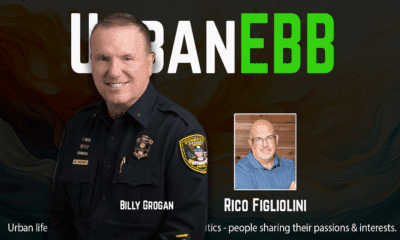Community
Who were the brave new settlers? – Book Excerpt
Published
4 years agoon
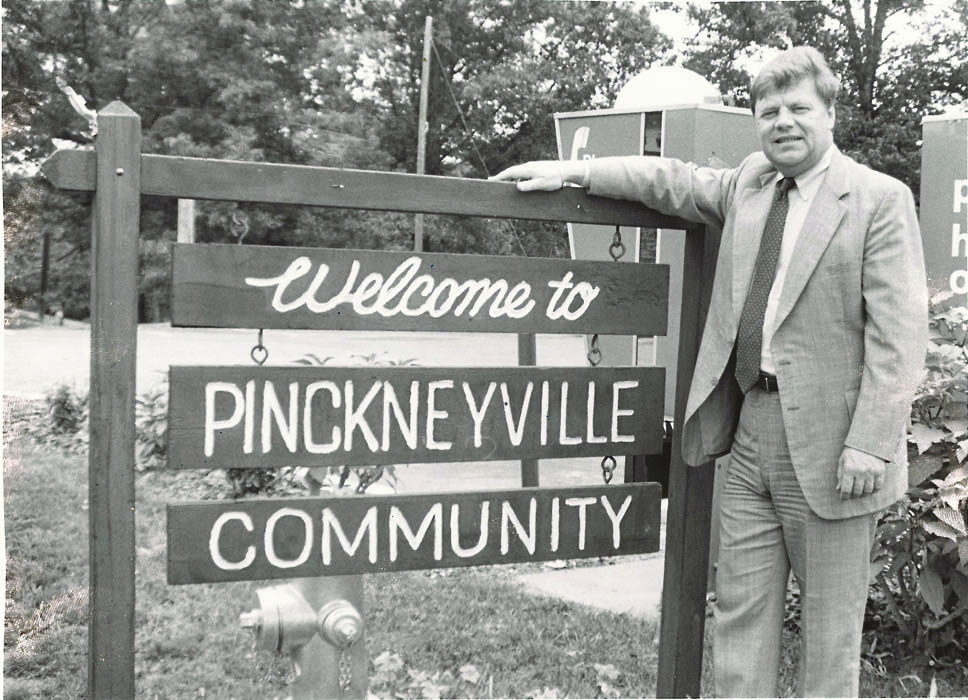
* An excerpt of “Peachtree Corners, the History of an Innovative and Remarkable City”.
The new Georgia territory, a frontier that opened to the south and to the west at that time, was explored and settled, in part, to serve as a buffer protecting South Carolina from Spaniards coming north from Florida. Contrary to some popular historical accounts, Georgia was not settled just by prison debtors brought from England by British parliamentarian and soldier James Oglethorpe. For the new colony Oglethorpe founded, trustees sought out carpenters, tailors, bakers, merchants, and farmers to settle the region. Pioneers with these skills would ensure the success of the newest settlements.
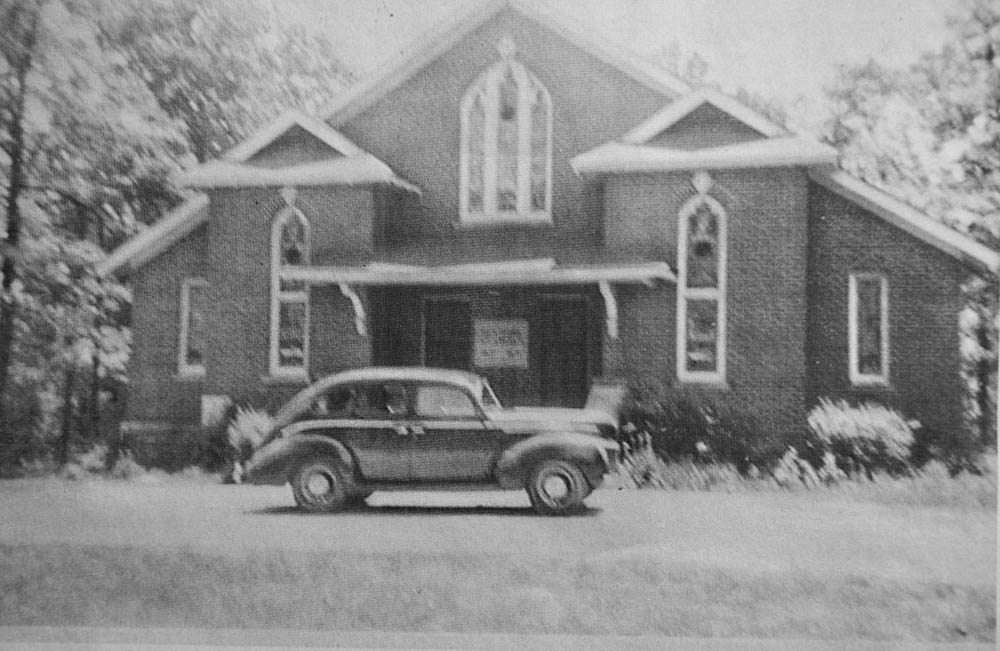
When Georgia was first colonized, it was a frontier state; not much land west of the area had been occupied or even explored by English settlers. Early maps, including an 1825 map outlining the stagecoach route through the town of Pinckneyville, show DeKalb, Gwinnett, and Hall counties bordered by the Chattahoochee River, and territory north of the river is labeled “Cherokee Indian” territory.
Pinckneyville and the Hunnicutt Inn
Bentley’s Nursery and Stoneyard, located at 3319 Medlock Bridge Road, sits adjacent to the four acres on which the old Hunnicutt Inn in Pinckneyville was located. The inn also served as a stagecoach stop, a spot of great importance to travelers and merchants in the early 1800s.
The Hunnicutt Inn was also a Cherokee Trading Post for a time. Today, a self-storage warehouse is located on that richly historical spot.
Travelers depended upon the stagecoach, since traveling alone was both unsafe and uncomfortable. Businesses and banks used stagecoaches to transport goods, money, and mail. That same stagecoach line made cattle trading possible from points west down to south Georgia. Farmers made use of the stagecoach to do business in the Atlanta market, and this particular stagecoach line provided a vital connection to the neighboring state of Alabama. From the late 1700s until railroads began to crisscross the state in the late 1800s, the stagecoach lines were as critical to travel and business as airports are today.
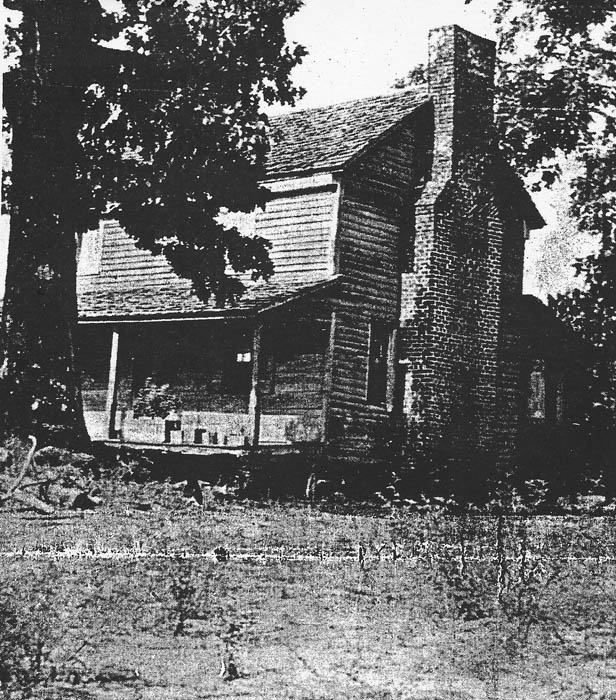
The Hunnicutt Inn served as a stagecoach and travelers’ stop until just after the Civil War, when the railroad was built. Records indicate that a tavern was located either inside or adjacent to the inn, and it was owned by a man named William Greer. The inn was a massive wooden structure held together with large nails and thick, wooden pegs, made by Hunnicutt himself. Where the inn once stood, rusty handmade nails, wooden pegs, and pieces of heavy timber can still be unearthed on that piece of property today. They are all that’s left of that historically rich frontier inn and stagecoach stop.
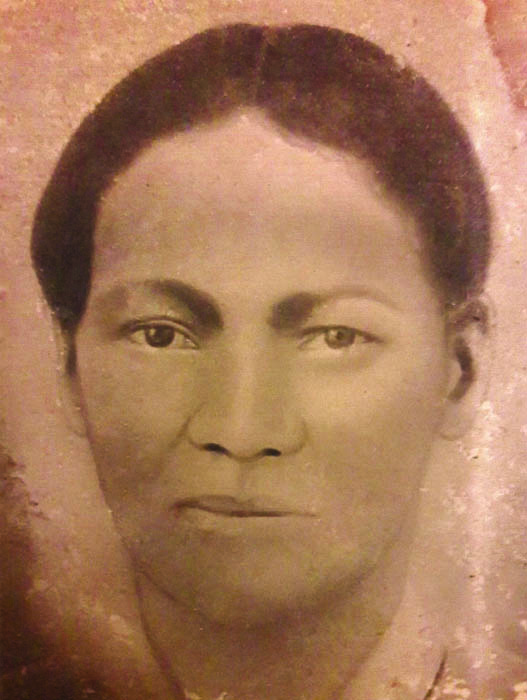
Massive fireplaces and wide plank wood floors were characteristic of the Hunnicutt Inn and other such structures in the early 1800s, as was one interesting feature that was most necessary in the days when Georgia was the westernmost frontier of the young country. A trap door in the wide front porch opened to a safe hiding spot from raiding Indians. Tensions often arose between the new settlers and Native Americans, especially the Creek, who didn’t become a minority population in Georgia until the mid-1700s. The encroachment of the arrogant new settlers, with their brash ways and empty promises, provoked even the most hospitable Native Americans.

A stagecoach map, on display in Mt. Carmel United Methodist Church in Peachtree Corners, clearly shows that the territory north of the Chattahoochee River was designated as Cherokee Indian Territory. That same map shows the westernmost area of Georgia, abutting Alabama, was designated “Lower Creek Indians.” Settlers coming into the area known today as western Gwinnett County were truly a brave lot of frontier pioneers.
The Enchanted Land
The community of Pinckneyville was settled in the early 1800s; most accounts cite 1826 as the year Pinckneyville was established. However, some records indicate the name “Pinckneyville” was first used for the settlement as early as 1799. The sparsely populated area and its farmers were settled just east of the Chattahoochee River, an early nod to the farmers’ respect for the river and the rhythm of regular flooding along the riverbank. The Chattahoochee governed a great deal of the farmers’ fortunes, not only because of its nutrient-rich bottomland and the abundance of crops that it produced, but also because of the frequency with which the river flooded well beyond its boundaries. Farmers and landowners had to contend with the Chattahoochee’s flooding until the 1950s, when the river was dammed, and Lake Lanier was built by the U.S. Army Corps of Engineers. The lake was named for Sidney Lanier, a Confederate soldier, poet, and graduate of Oglethorpe University in Atlanta, because of his poem “Song of the Chattahoochee.”
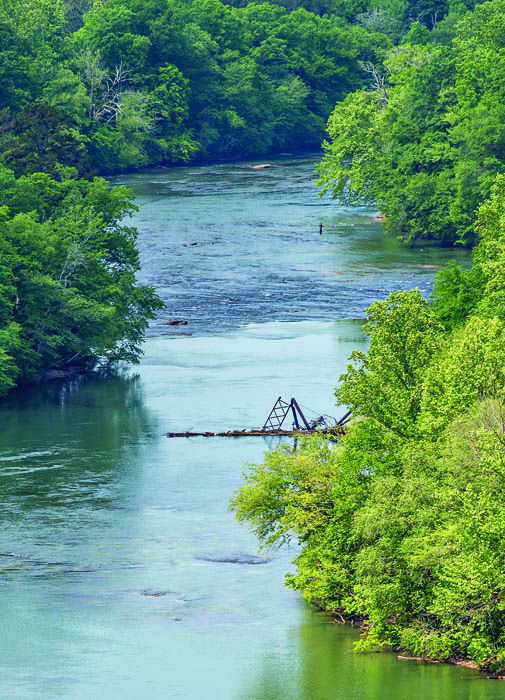
Jonathan Phillips)
The river, of course, meant as much to the Creek and Cherokee people as it did to the new settlers. A thorough chronicling of the history of Peachtree Corners cannot be complete without including the fate of the Native Americans who lived in the area before the English settlers arrived.
As early as the late 1600s, Native Americans inhabited Georgia, including the area that would not be named Gwinnett County for more than one hundred years. They had dubbed north Georgia the “Enchanted Land.” Dense forests, clear rivers and lakes, and plentiful wildlife made the region a haven for them, as well as for intrepid English, French, and German settlers. And while “white” settlers were legally prohibited from settling in the regions occupied by Native Americans, some defied the law and squatted in Indian territory anyway.
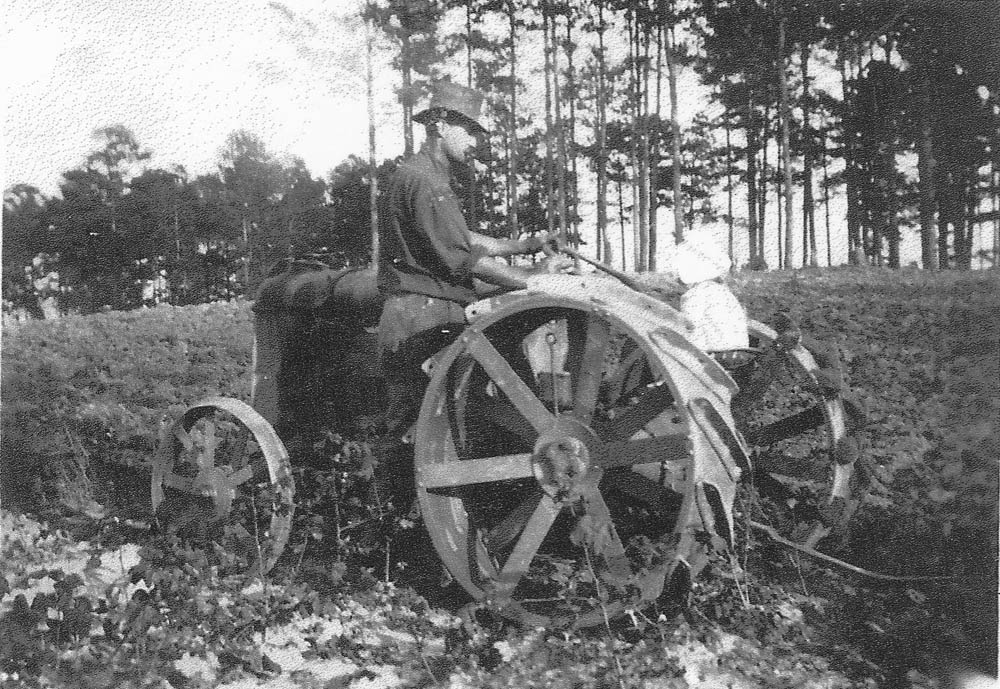
climate were perfect for growing corn (Medlock family – Jane Garner)
Nowhere was the land more enchanted than in the area now designated Gwinnett County. The natural resources and mild climate were powerful draws, not only for Native American tribes, but also for settlers seeking to make a home and a living in the New World. Pioneering families came to the state with a desire for adventure, exploration, and a new start in a grand new land of plenty. The vastly different cultures and practices were bound to collide.
With advanced agricultural practices, sophisticated tools and weapons, beautiful art, schools, courts, houses, and villages built of wood structures, the Creek and Cherokee people were known as two of the five civilized nations in the New World. The Cherokee were close allies, as well as trading partners, with the British during much of the 18th century. Still Cherokee, and often Creek, raiding parties would attack the new backcountry settlers who were illegally living on, or even encroaching on, their lands. In addition to direct attacks by Native Americans, settlers often got caught in the midst of skirmishes between Cherokee and Creek warriors. Settling in Georgia in the early 1800s was most definitely not for the faint of heart, but the draw of the ancient river and the fertile bottomlands that bounded it was too powerful for courageous settlers to resist.
—Excerpt from “Peachtree Corners, the History of an Innovative and Remarkable City 1777-2020” by Carole Townsend.
History of Peachtree Corners’ Book to Debut Soon
Peachtree Corners has a rich and colorful history. Centuries ago, Native Americans roamed the land bordered by the Chattahoochee River and later, strong and resilient families settled in the area and farmed the fertile land. Today, the city has become a magnet for futuristic technology.
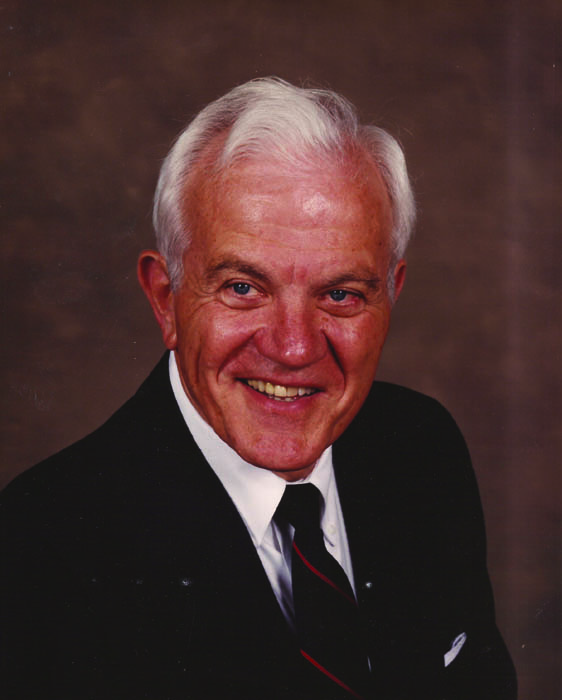
The City of Peachtree Corners announced that its storied past has been captured in the community’s first history book. The book, titled Peachtree Corners, the History of an Innovative and Remarkable City 1777-2020, is filled with stories of long ago. Numerous historical photographs add to the story of the community’s rich past. The 230-page coffee table-style book is expected to be released soon.
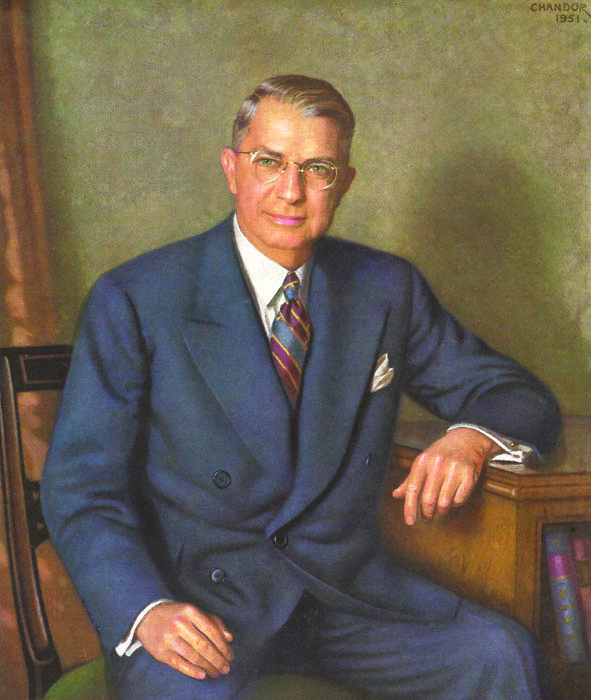
Well-known author Carole Townsend tells the story of the early days when the Creek Indians claimed the land as their own, then takes the reader on a journey of the early settlers through the eyes of long-time residents who recall farm life. That life was hinged on a good crop year which determined if the farmer’s children would have new shoes for the coming school year. The city’s history ends with its modern-day transformation that began in the 1970s when Georgia Tech engineer and developer Paul Duke began purchasing land for Technology Park and the surrounding community.
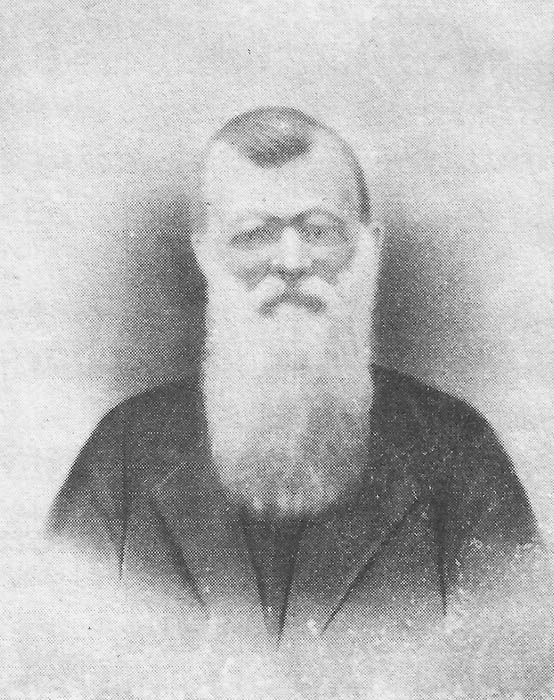
“What an honor it was for me to be invited to trace Peachtree Corners’ history back to the days of Native American inhabitation,” said Townsend. “For a city as progressive as this one is, to honor its history as it has with this unique book, is truly remarkable.”
Townsend, an Atlanta native and 30-year Gwinnett resident, is a longtime journalist and published author with six books to her name. She was named a finalist for the 2017 Georgia Author of the Year Award for “Blood in the Soil,” a true account of the shooting of controversial publisher Larry Flynt.
“This book thoughtfully recounts the past and present of our community through personal narratives of the people who lived here and knew it best,” said Mayor Mike Mason. “It’s their memories and photographs that we set out to capture and preserve. What is the future of Peachtree Corners? That’s a story for another book.”
Peachtree Corners, the History of an Innovative and Remarkable City, was published by Deeds Publishing, in Athens, Georgia, and will be available through the city of Peachtree Corners’ website.
Books must be purchased online and then picked up at City Hall (Monday – Friday 9 a.m. – 4 p.m.) Please allow 2 days for processing and then the order may be picked up at the receptionist desk. All sales are online, no walk-in purchases available. Purchase copies here
Related
Community
Peachtree Corners Festival Awards Debbie Mason Drama Scholarship for 2025
Published
3 days agoon
June 2, 2025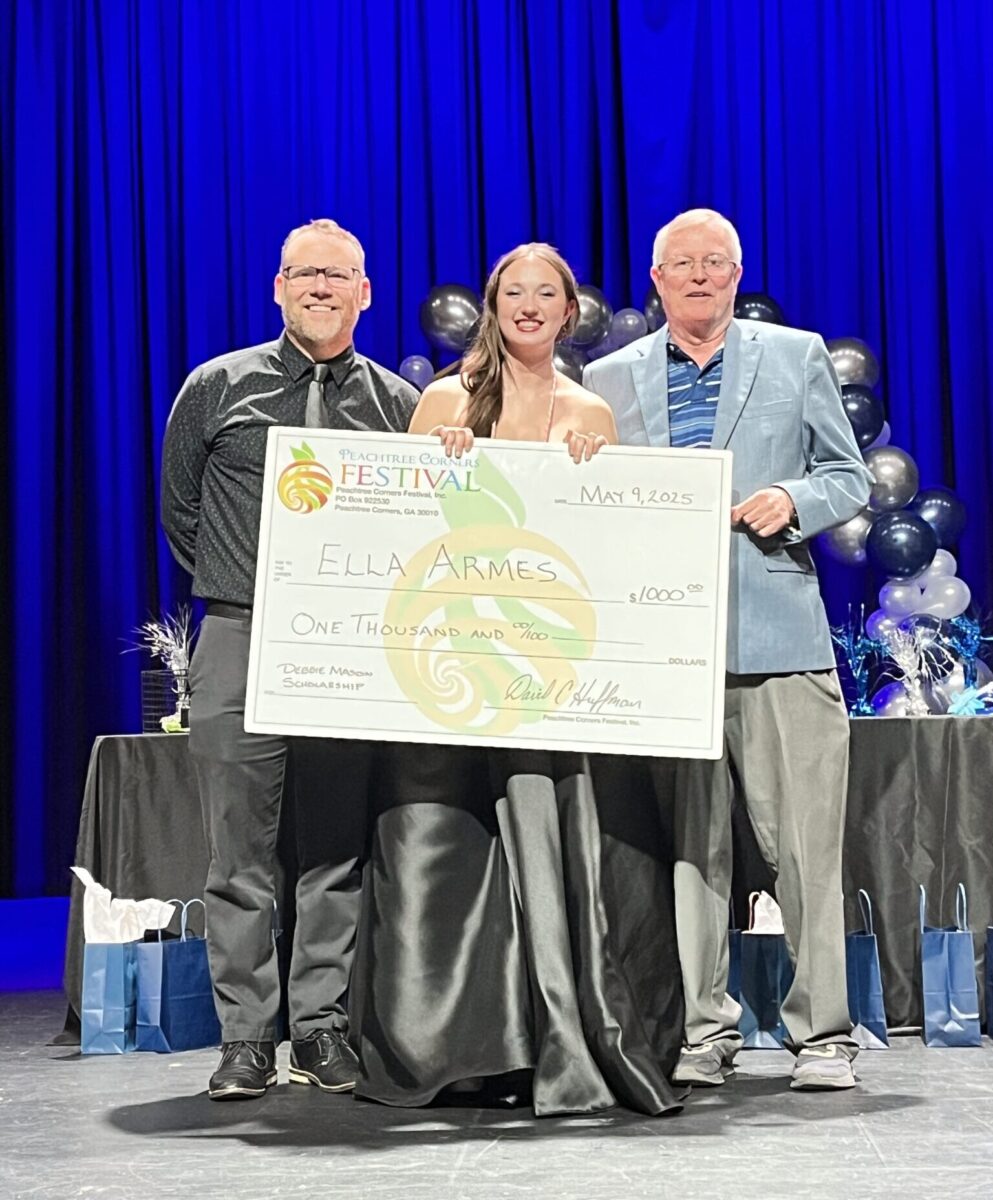
On May 9, the Peachtree Corners Festival awarded the Debbie Mason Memorial Scholarship for Drama to an outstanding Norcross High School drama senior. The recipient was Elizabeth “Ella” Armes, a student who has been involved in the Norcross High School drama department for four years and was most recently the primary stage manager directing the high school’s performances.
According to Terry Gabbard, director of theater at Norcross High School, Ella “was vital to the success of our program. She is an incredible young lady who will be continuing her studies in media and the arts in college.”
In fact, Ella plans to continue her education and work in theater and communications at Kennesaw State University starting this fall.
This marks the third year that the Peachtree Corners Festival has awarded the drama scholarship in the name of the late Peachtree Corners Festival co-founder, Debbie Mason.
In addition to being the first “First Lady” of the city of Peachtree Corners, Debbie and her family were long-time supporters of the drama program at Norcross High School. After her passing in 2023, the Peachtree Corners Festival established the Debbie Mason Memorial Scholarship for Drama as an appropriate way to honor her legacy.
About the Peachtree Corners Festival
The Peachtree Corners Festival is a non-profit, 501(c)(3) volunteer organization dedicated to bringing a safe, wholesome and family-friendly festival to the city of Peachtree Corners each year.
The organization’s goal is to foster community pride and civic involvement, not just through the weekend-long festival, but by giving back and supporting education and beautification initiatives within the city and recognizing deserving members of the community.
This year’s Peachtree Corners Festival will take place on the Town Green, September 20–21.
For more information, visit peachtreecornersfestival.com.
Related
Community
The PCBA Awards $500 to Light Up The Corners at After-Hours Event
Published
1 week agoon
May 28, 2025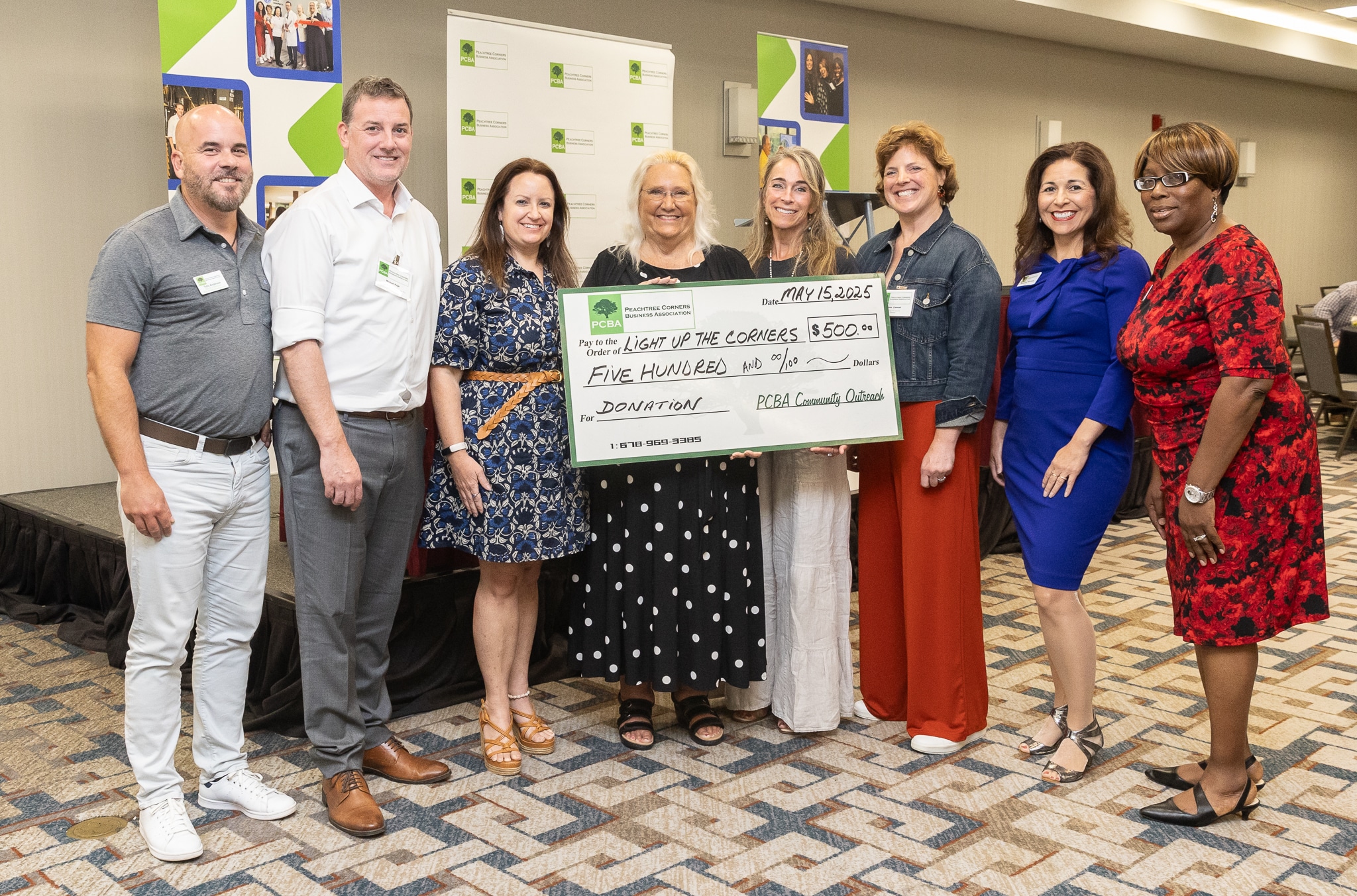
The Peachtree Corners Business Association (PCBA) awarded a check for $500 to Light Up the Corners at their May 2025 Business After Hours event.
Light Up the Corners, a 501 (c)(3) nonprofit, organizes the annual Glow Run and Twilight Trot — a nighttime, community celebration that’s equal parts race, fun run, party and fundraiser.
This year’s event is scheduled for Saturday, August 16 at The Forum in Peachtree Corners. The 1K Twilight Trot will start at 8 p.m., and the four-mile Glow Run will begin at 8:30 p.m. After the runners have crossed the finish line, a fun, post-race party will follow.
All proceeds from the Light Up the Corners event go to benefit less fortunate children and families in the community by giving them the chance to participate in life-enhancing programs and activities at the Fowler YMCA.
A history of charitable donations
PCBA’s donation to Light Up the Corners will help the organization meet its goal of assisting struggling families through their Why It Matters campaign. It’s the latest in a series of donations that PCBA has made over the years through their community outreach program.
“We are so proud that the PCBA has awarded 20 scholarships to outstanding future business leaders and donated in excess of $173,500 into our metro Atlanta community over the last 13 years,” said Lisa Proctor, PCBA board president.
Funds for PCBA’s community outreach program are raised throughout the year from PCBA membership, sponsorships and Tailgates and Touchdowns, an annual charity event they hold each August. Donations and scholarships are awarded at their Business After Hours events so that their members have the opportunity to learn more about the community organizations.
About Peachtree Corners Business Association
The Peachtree Corners Business Association is a business membership organization that focuses on innovative approaches, programs, shared resources, community outreach and opportunities for member businesses and professionals to connect, develop, grow and prosper.
The PCBA is made up of businesses of all sizes and types that want to expand their reach and grow their business within Peachtree Corners and the greater metro Atlanta area.
For more information call 678-969-3385, email membership@peachtreecornersba.com or visit peachtreecornersba.com.
Related

Annual multi-genre convention celebrating Japanese anime, American animation, comics and gaming sets new record with 59,222 attendees
— Article updated May 29, 2025
Atlanta welcomed nearly 60,000 fans of cosplay, comics, gaming, anime and music over the four-day Memorial Day weekend — all meeting up at the Georgia World Congress Center to celebrate MomoCon 2025 and its 20th year in the city.
One of the fastest growing, all-ages conventions in the country, this year’s numbers topped the 56,000 guests that attended in 2024, and was estimated by the Atlanta Convention & Visitors Bureau to have a $42.2 million impact on the metro area.

Equally important, the buzzing enthusiasm and pure joy of the weekend, from both attendees and featured guests, was unmatched. Everyone seemed to be having an incredible time. And plans are already in the works for an even more impressive — and expanded — MomoCon experience in 2026.
Organizers say they are expanding into both Hall A and Hall B next year, increasing the total space to a massive 1,045,178 square feet for exhibits and gaming. The team is already hard at work planning amazing new guests and activities for MomoCon’s 21st year.
Registration for next year’s event is already open, with early-bird discounts for fans who want to lock their passes in early.
Giving back to the community
In addition to the money brought into the city and to the convention itself, MomoCon chooses a charity each year in which to support with donations. Funds are raised through sales of specialty merchandise and custom events that have donation elements built in.

The 2025 official charity was the Johnson STEM Activity Center. MomoCon raised more than $5,000 for the center and contributed an additional $7,500 in matching funds, bringing the total donation to $12,500. MomoCon organizers also worked with 11 Atlanta-area, youth-serving nonprofits to give back by bringing more than 900 kids in need to the convention.
Nonprofits receiving tickets this year included Scouting America, Horizons Atlanta, ReImagine ATL, the New Media Education Foundation of Georgia, Purpose Possible, Lekotek, Focus, Boys & Girls Clubs of Metro Atlanta, Big Brothers Big Sisters of Atlanta, Wellroot Family Services and the YMCA.
Fan-favorite comic book artists
Comic book artists (and original members of the former Atlanta-based Gaijin Studios), Cully Hamner and Brian Stelfreeze made their first appearances at MomoCon this year, invited to attend and show off their work in the Artist Alley.
Fans lined up to meet them, along with fellow award-winning artist and longtime friend, Wade von Grawbadger, to get photos, autographs and artwork and spend a few minutes chatting with the guys.
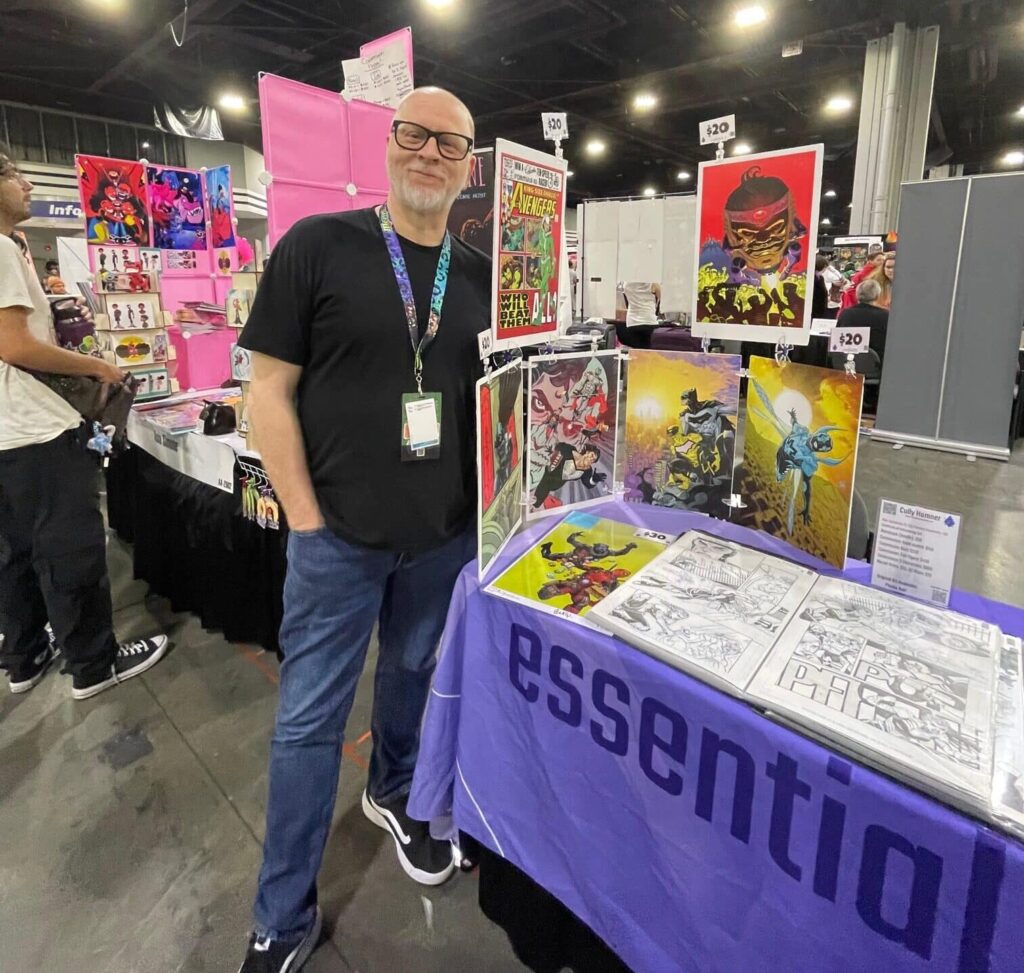
Hamner talked briefly about an upcoming project, “Ruby Actual” that he’s doing with Greg Rucka. “Not sure when it will come out,” he said, “But we’re hoping first quarter 2026.”
In the meantime, comic fans can continue to enjoy his previous work — the acclaimed, creator-owned RED (which was adapted into two films), the current Blue Beetle (also adapted to film) and all of the other work he’s done for DC, Marvel and other publishers over the last 30 years.
They can also look forward to his return to MomoCon in the future if schedules work out.
“This has been a lot of fun,” Hamner said on Sunday, the last day of the convention. “I’d love to come back if they invite me again.”
Stelfreeze agreed. “I enjoyed [MomoCon],” he said. “I really liked seeing the younger audience.”

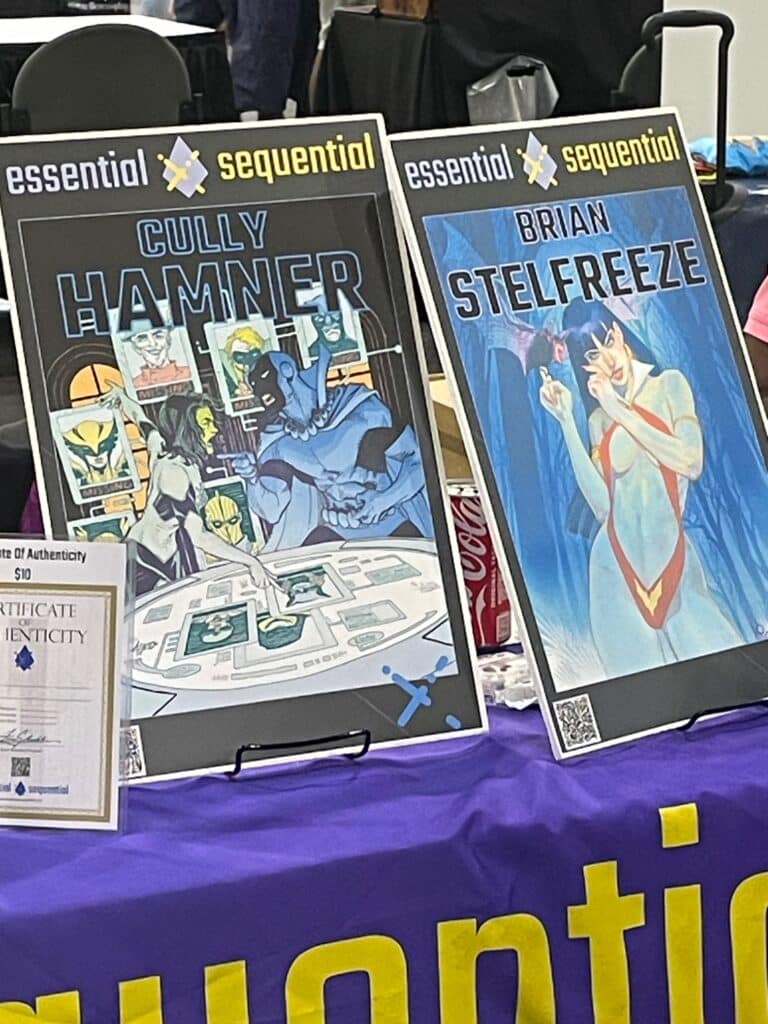
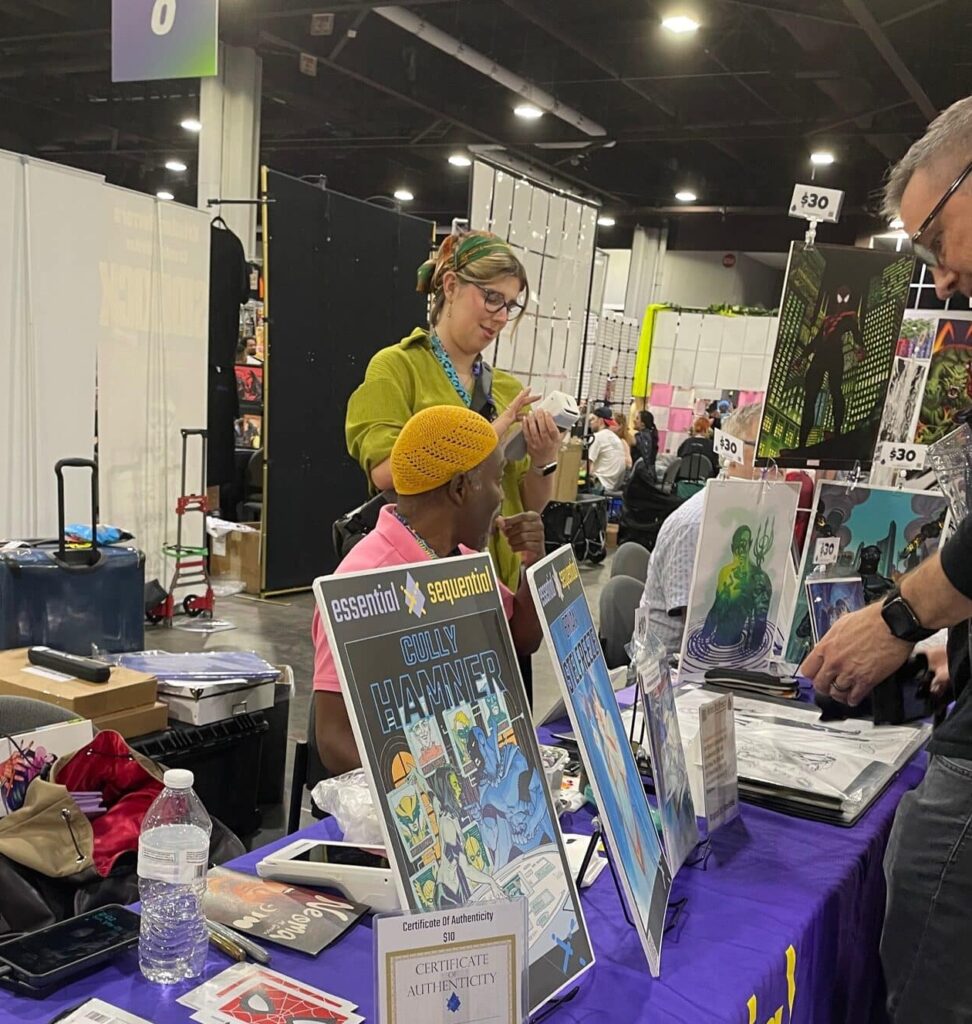
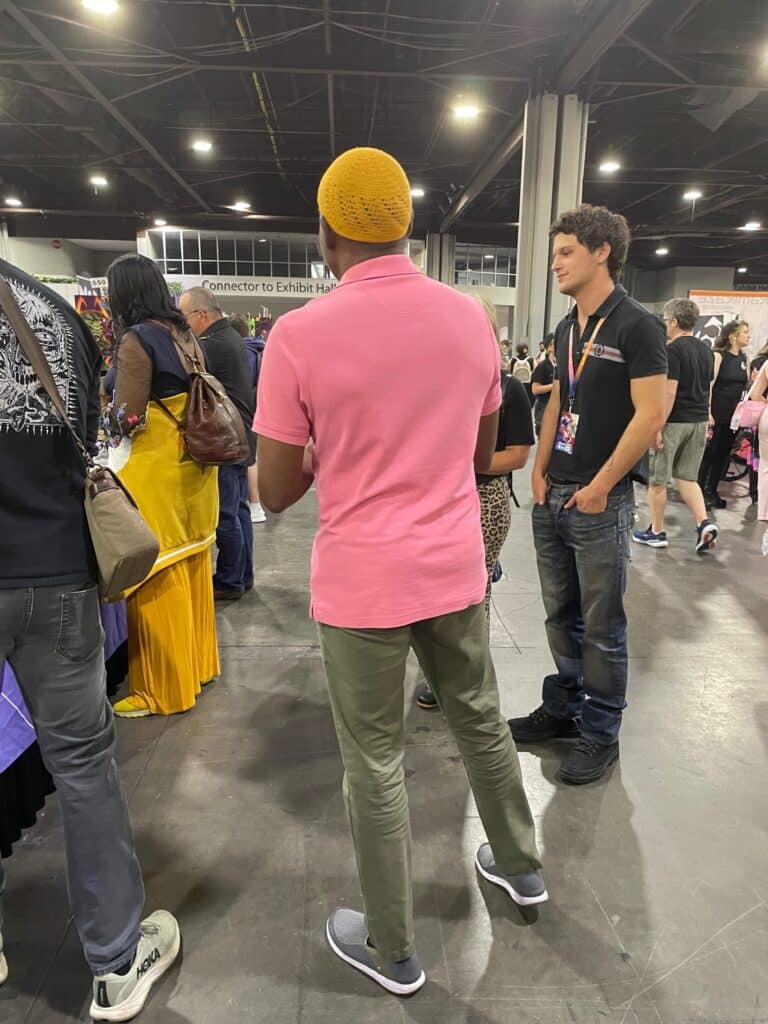
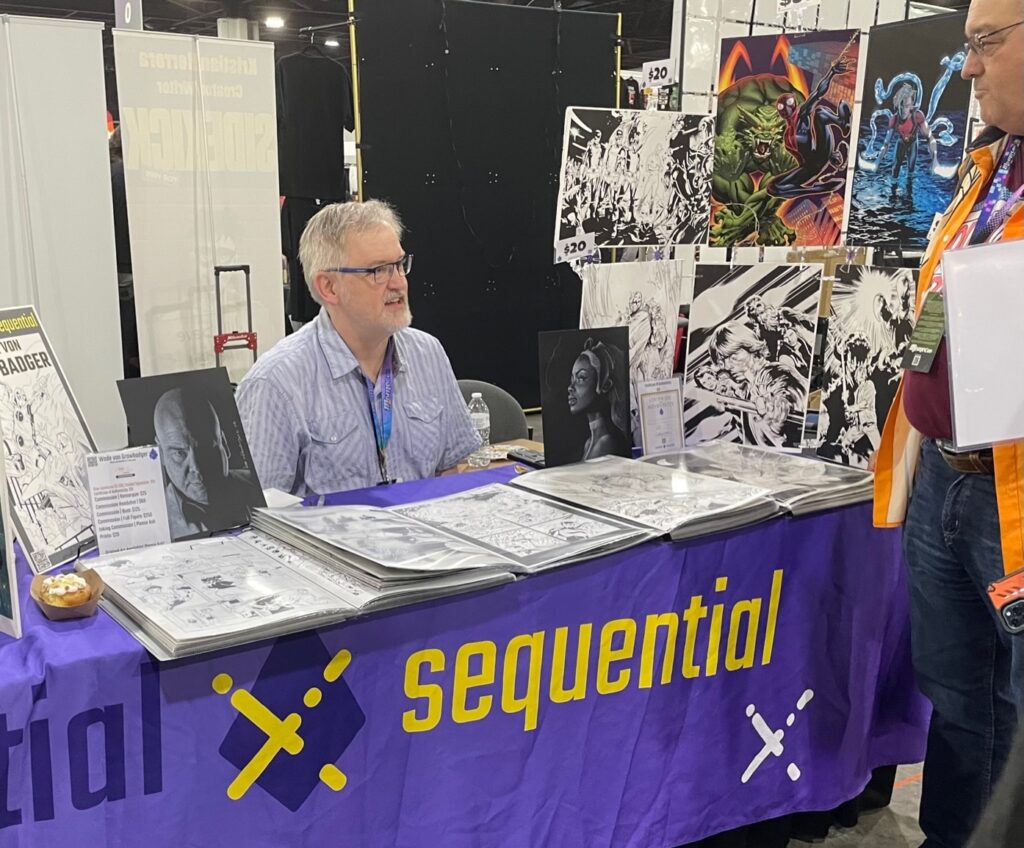
That definitely seemed true on Sunday, as the crowds had thinned out some and Stelfreeze had more time to hang out and talk with people who stopped by the Essential Sequential booth. With some fans, he spent ten minutes or more discussing art, comics and other topics, and even came out from behind the table at times to meet people and say hi to old friends.
Featured guests
Other featured guests also drew long lines of fans who were eager to meet their favorite creators.
Darryl McDaniels (from RunDMC and now a comic book and children’s book author), Greg Burnham (Norcross-based comic book writer known for his indie comic hits), Reed Shannon and Mick Wingert (voice actors and stars of Netflix’s “Arcane”), Ryō Horikawa (Japanese voice of Vegeta in “Dragon Ball Z”), veteran voice actor and producer, Chris Sabat, and online personalities such as Damien Haas were just a few of the standouts.
In fact, as the convention was winding down on Sunday afternoon, Haas’ fan line was still so long, the crowd filled multiple rows of the cordoned-off autograph area, both inside and outside of his designated line.
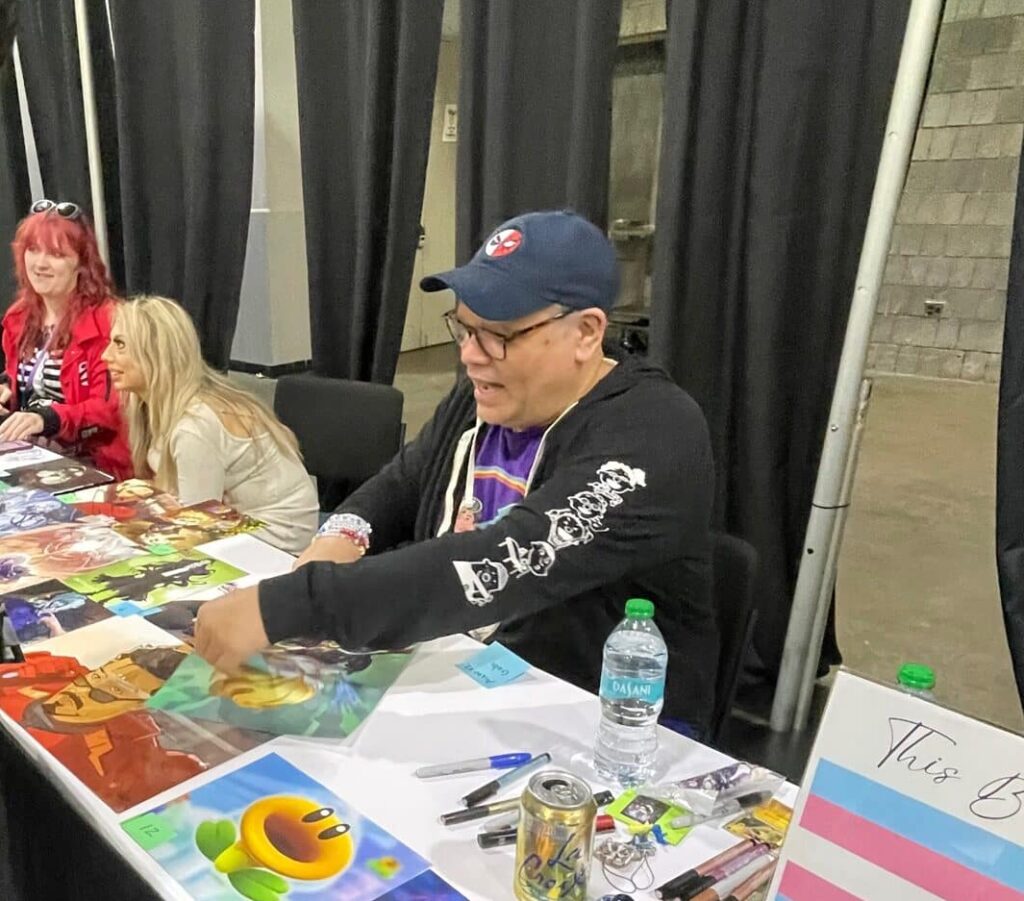
A full list of 2025 celebrity guests can be found here.
New for 2025
While most of the fun features of MomoCon 2025 were returning favorites — Artist Alley, Exhibitor’s Hall, panels, movie screenings and the cosplay showcase —convention organizers kept things fresh with a new theme (‘90s Retro) and a few new highlights, including a skating rink, an expanded online gaming area and the return of the“Bring Your Own Computer” space.
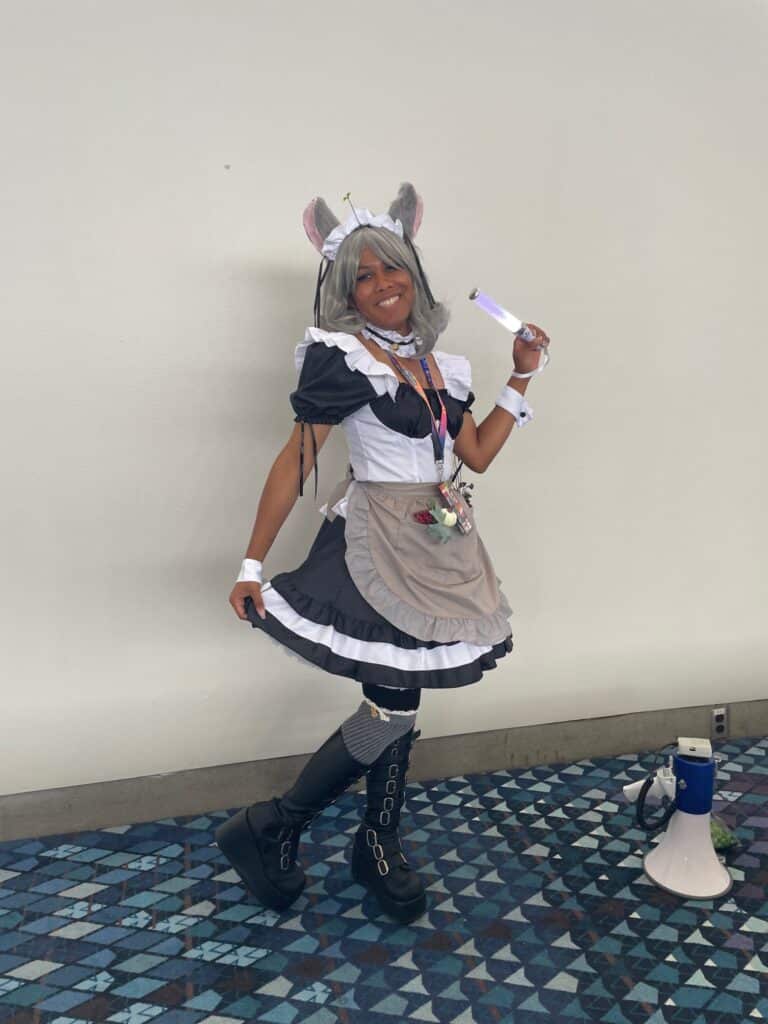
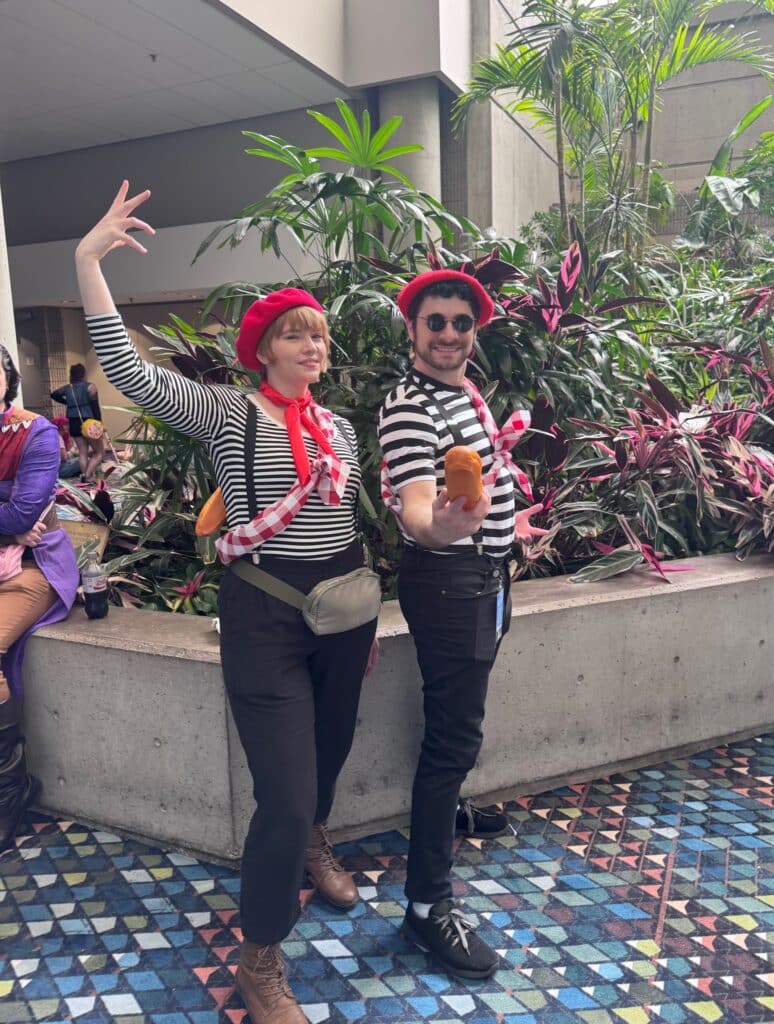
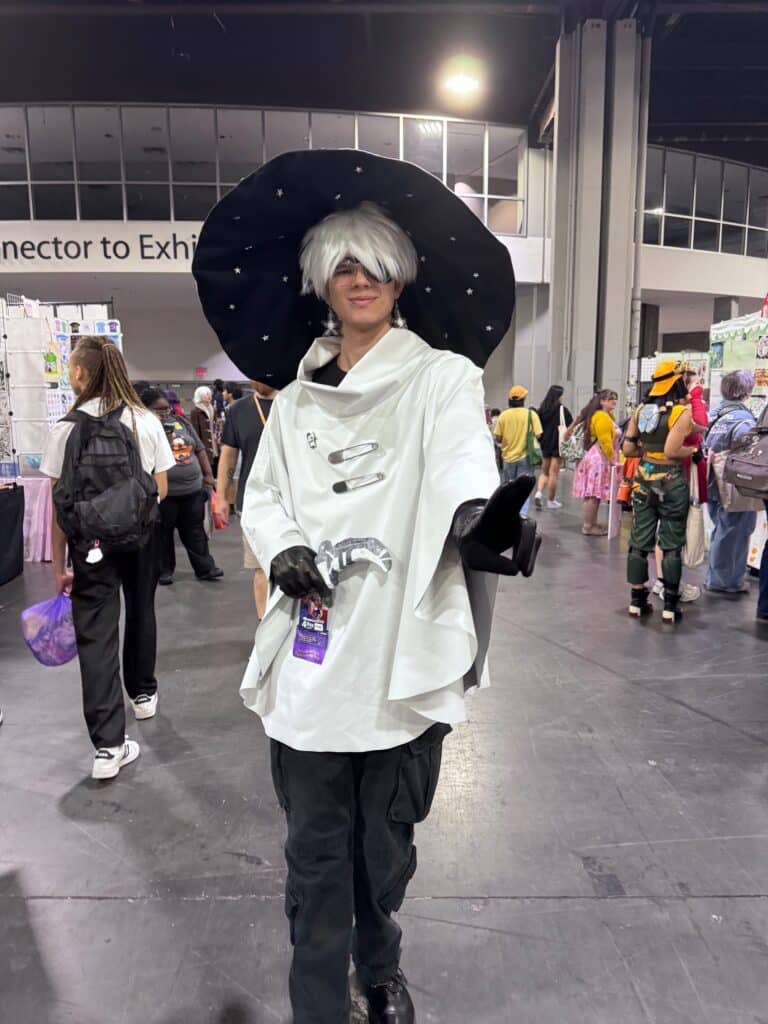
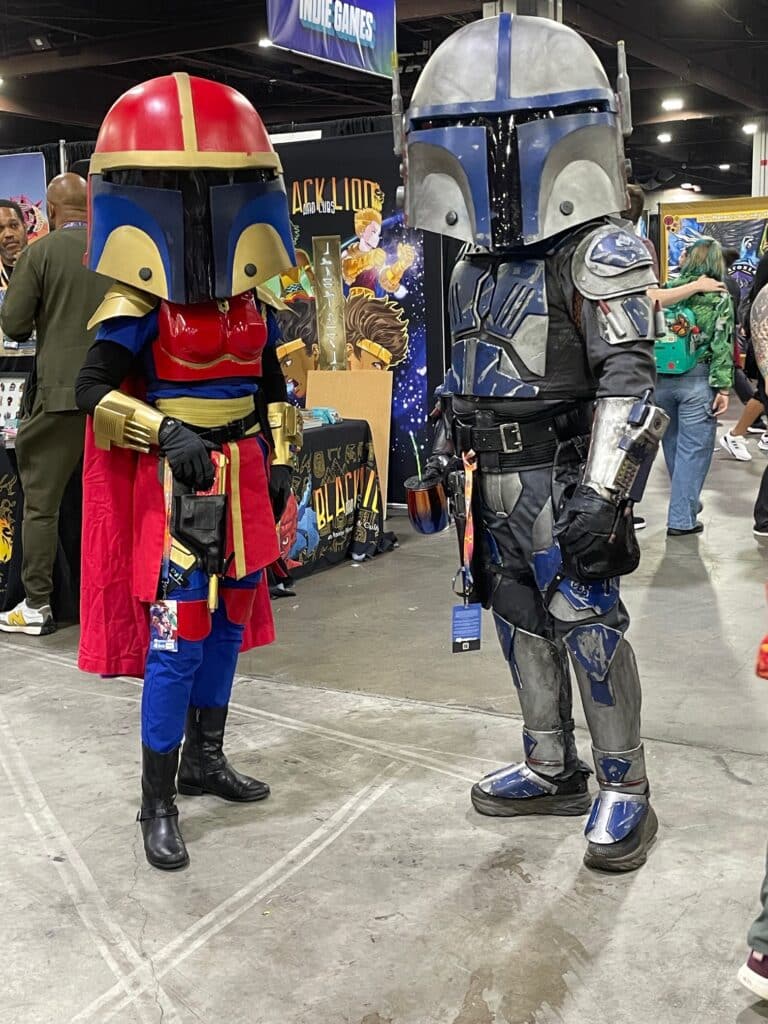

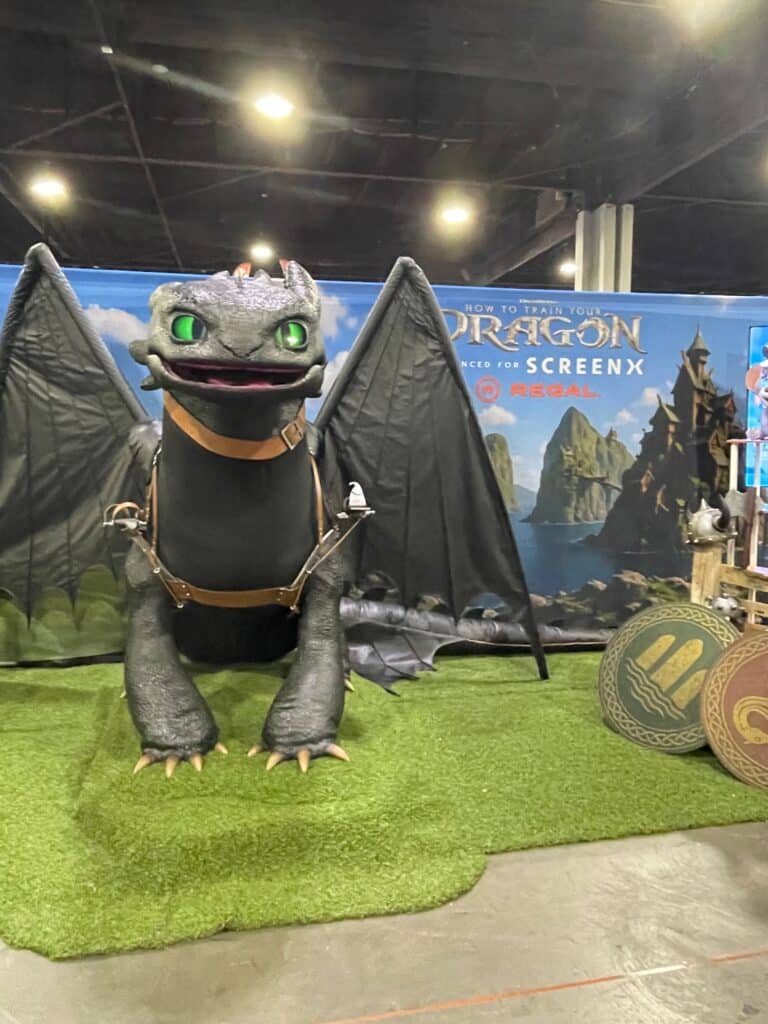
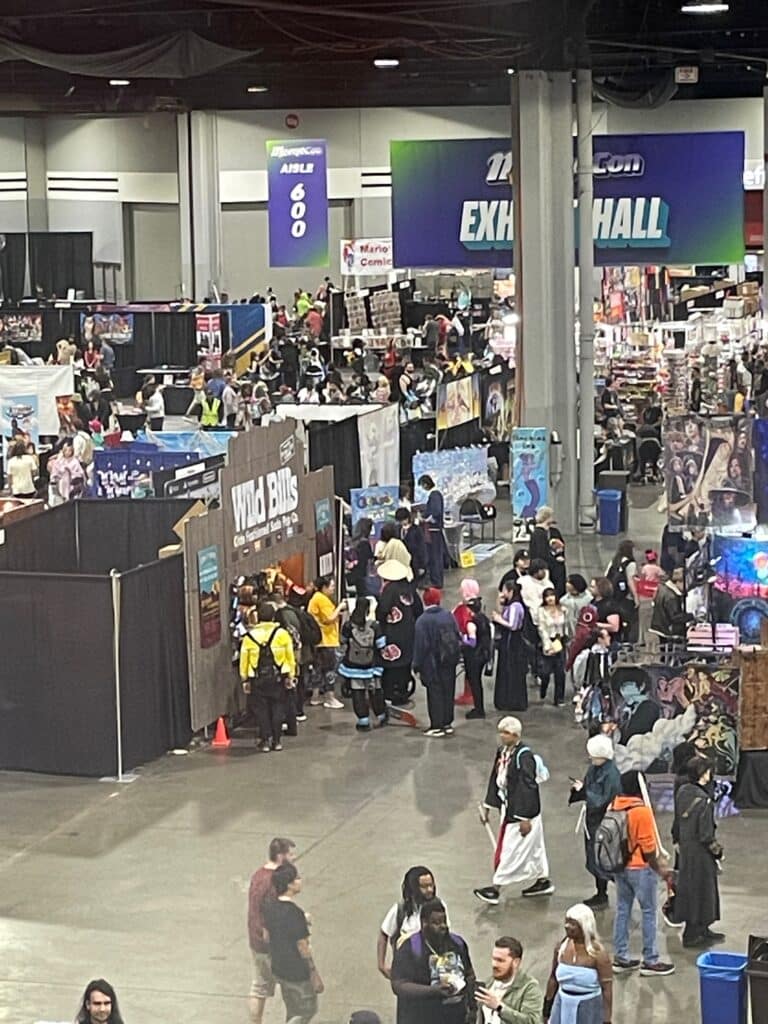
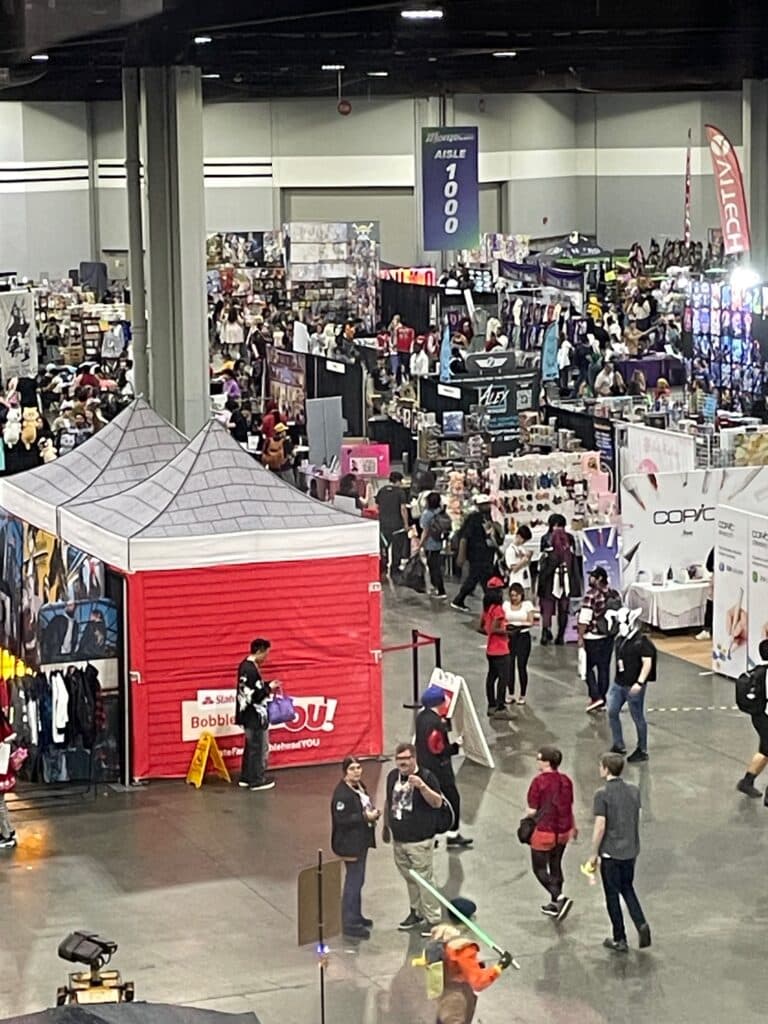
Workshops on everything from miniature painting and D&D to Gunpla modeling, as well as live performances and a massive vendor area and fan car showcase rounded out the exciting weekend.
Though tired from a whirlwind weekend of geek culture camaraderie and large (but super friendly) crowds, we can’t wait to see what MomoCon has in store for 2026.
For more about MomoCon, visit momocon.com.
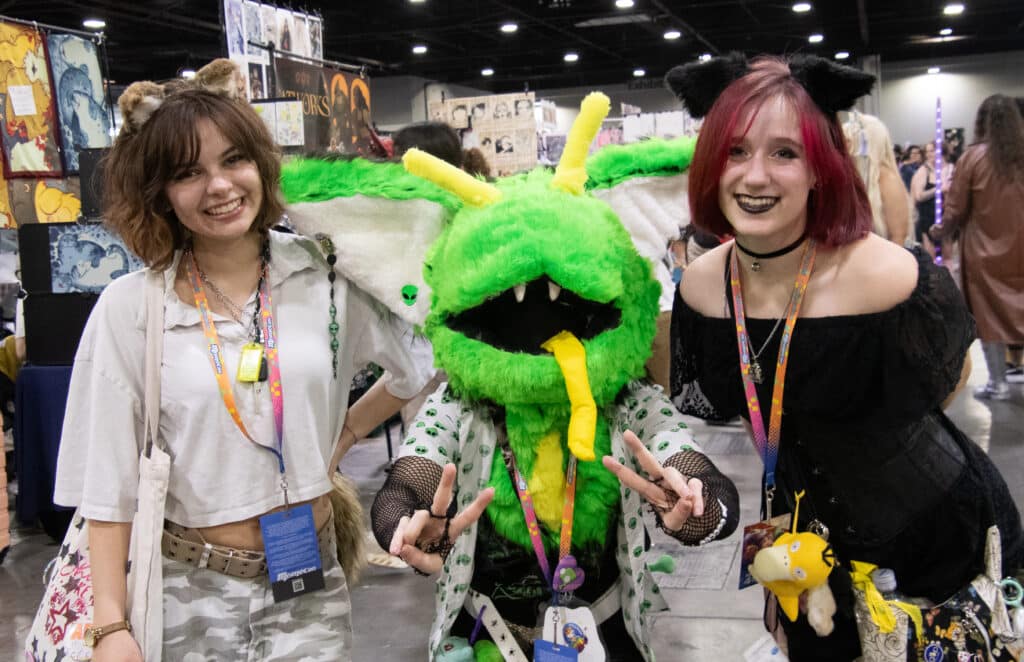
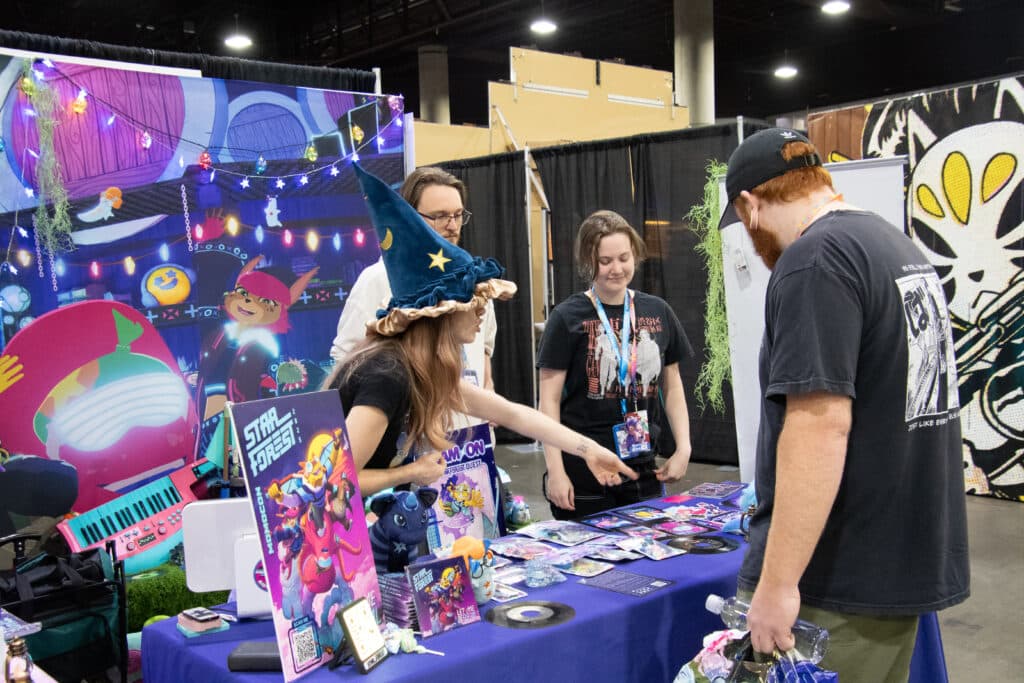

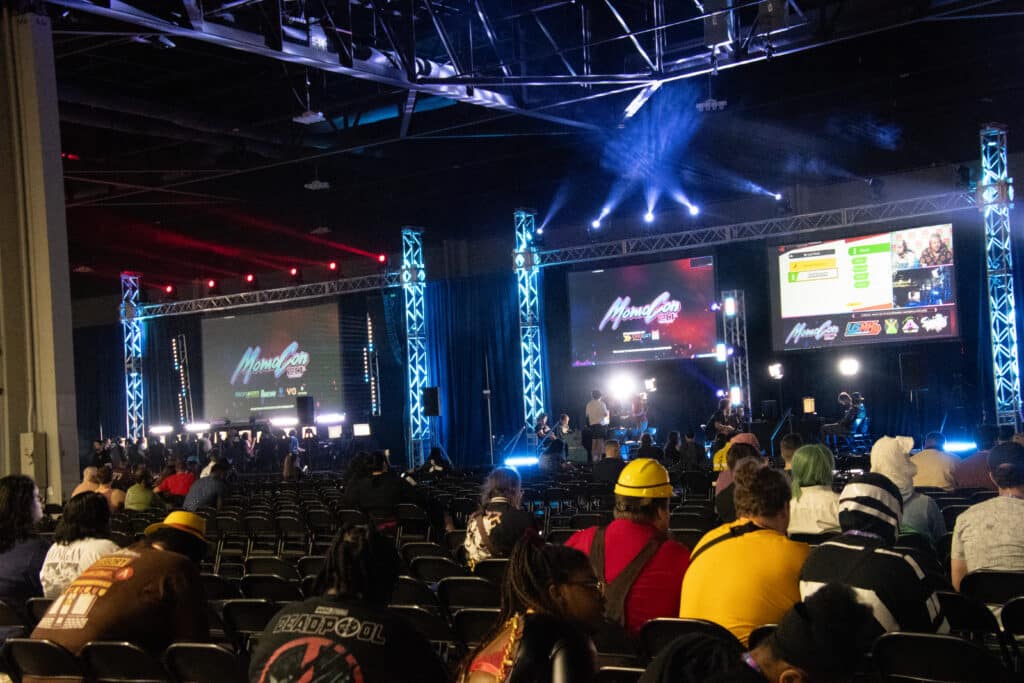

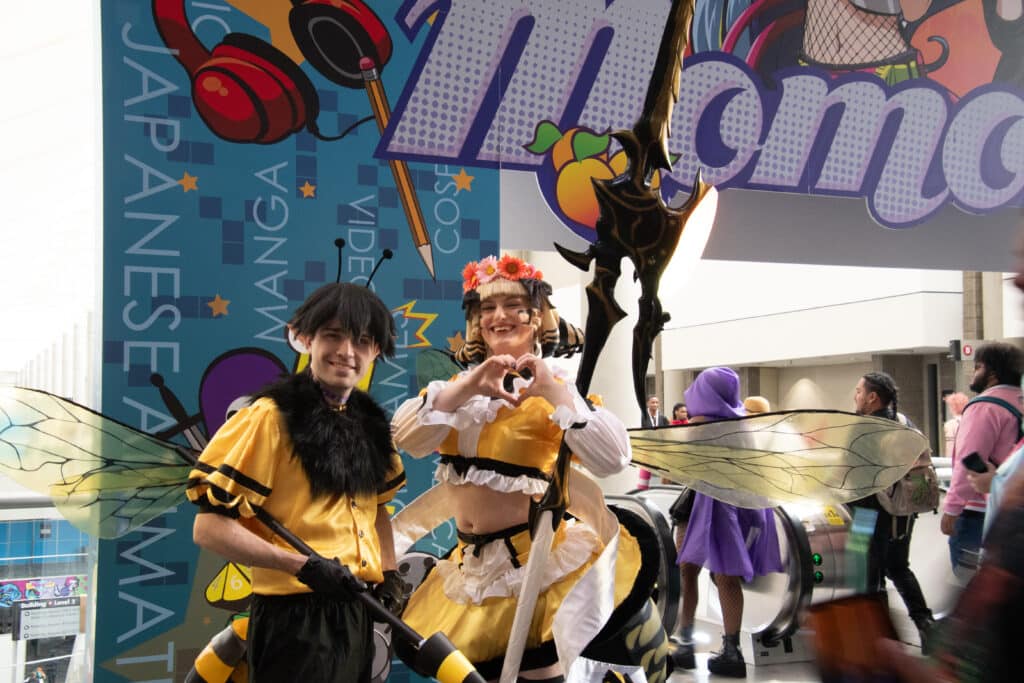
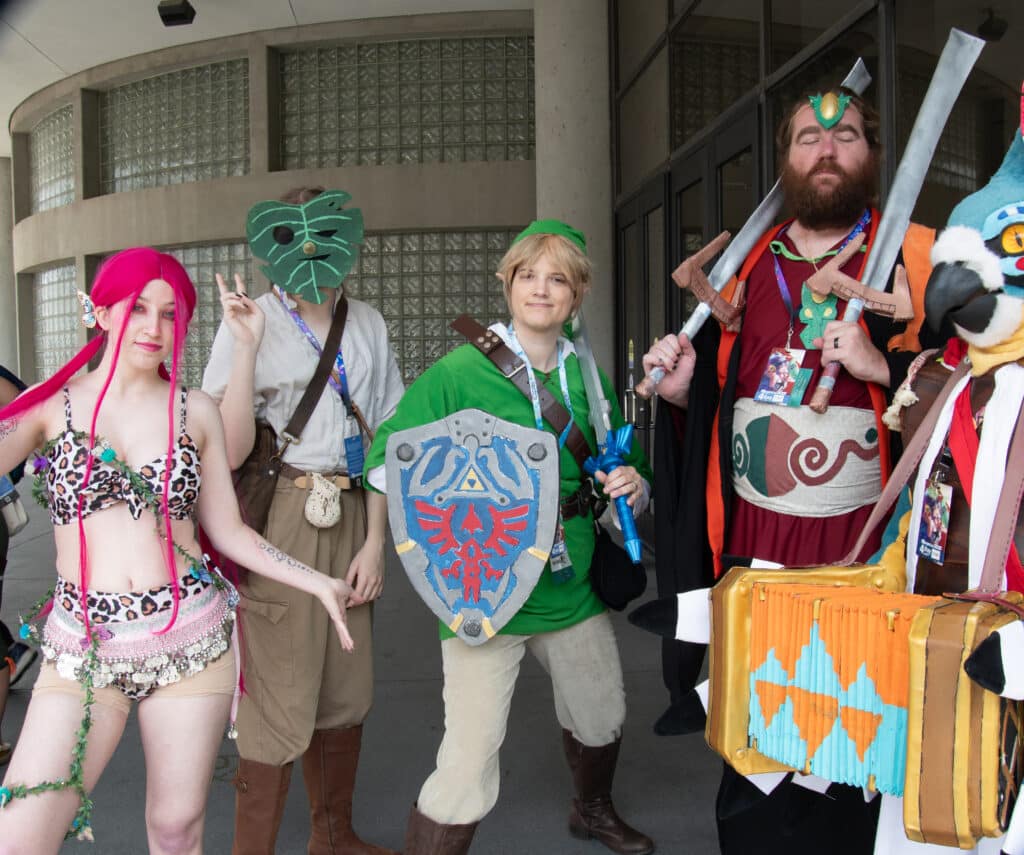



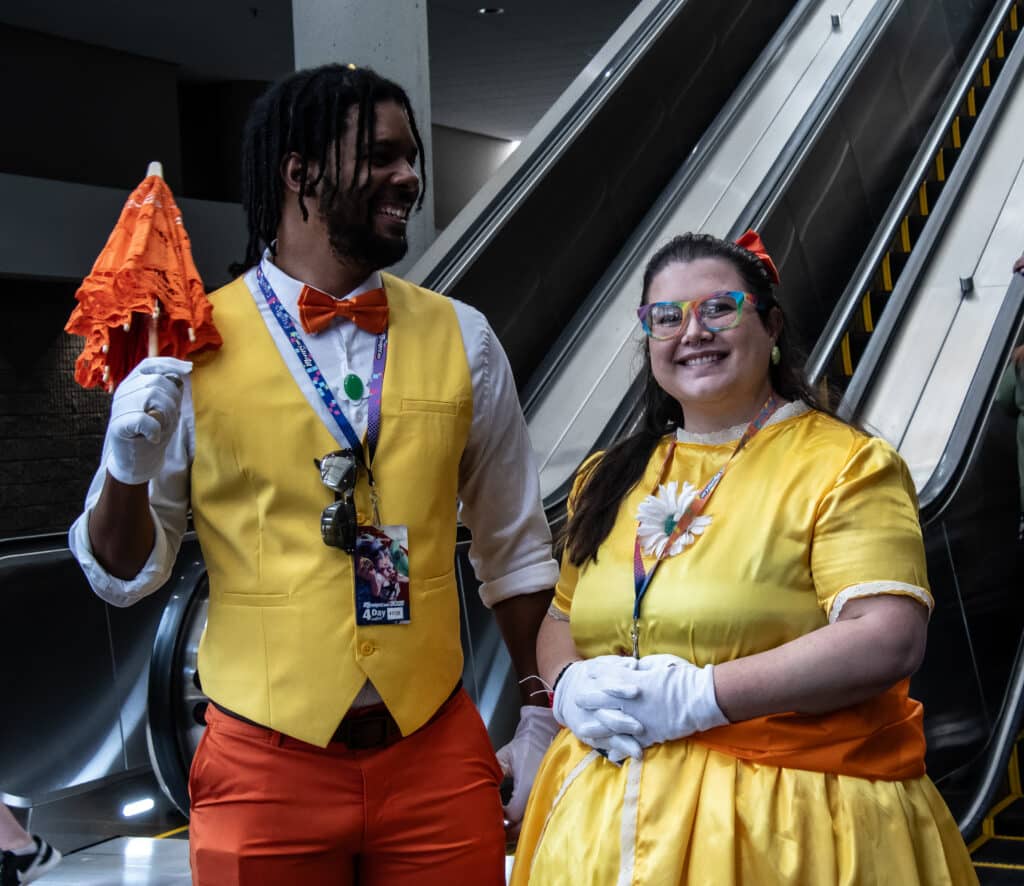

More moments from 2025; photos courtesy of MomoCon
Related
Read the Digital Edition
Subscribe
Keep Up With Peachtree Corners News
Join our mailing list to receive the latest news and updates from our team.
You have Successfully Subscribed!

“Geek Culture” Shines at 2025 MomoCon

Vox-Pop-Uli Launches RED Initiative for Veterans’ Support

City Collaborates with DNR for Deer Overpopulation Solutions

Celebration and Community: ICAGeorgia Wraps Up School Year with Two Festive Events

The PCBA Awards $500 to Light Up The Corners at After-Hours Event

Peachtree Corners Festival Awards Debbie Mason Drama Scholarship for 2025

From Zero to Accredited: Dunwoody’s Billy Grogan on Starting a City Police Department [Podcast]

Mustache The Band Set to Play the VoxStage on June 14

More Than Badges: Why Community Culture Drives Great Policing [Podcast]

The City and PCBA Welcome Ride Lounge with Ribbon Cutting Ceremony

From Zero to Accredited: Dunwoody’s Billy Grogan on Starting a City Police Department [Podcast]

Mustache The Band Set to Play the VoxStage on June 14

City Collaborates with DNR for Deer Overpopulation Solutions

Peachtree Corners Festival Awards Debbie Mason Drama Scholarship for 2025

Vox-Pop-Uli Launches RED Initiative for Veterans’ Support

The PCBA Awards $500 to Light Up The Corners at After-Hours Event

Light up the Corners [Video]

Capitalist Sage: Business Leadership in Your Community [Podcast]

Cliff Bramble: A Culinary Adventure through Italy

Top 10 Brunch Places in Gwinnett County

A Hunger for Hospitality

THE CORNERS EPISODE 3 – BLAXICAN PART 1

Top 10 Indoor Things To Do This Winter

The ED Hour: What it takes to Remove Barriers from Education

Peachtree Corners Life
Topics and Categories
Trending
-
City of Peachtree Corners3 days ago
City Collaborates with DNR for Deer Overpopulation Solutions
-
Community3 days ago
Peachtree Corners Festival Awards Debbie Mason Drama Scholarship for 2025
-
Podcast1 day ago
From Zero to Accredited: Dunwoody’s Billy Grogan on Starting a City Police Department [Podcast]
-
Entertainment1 day ago
Mustache The Band Set to Play the VoxStage on June 14








